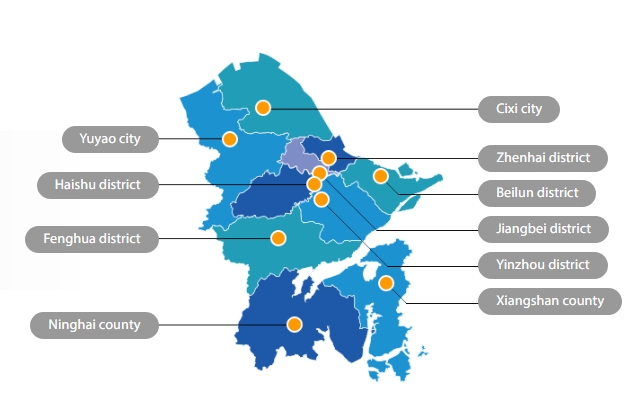Ningbo

GDP: about 1.65 trillion yuan (2023)
Permanent residents: 9.404 million (2022)
Location: southeastern part of East China's Zhejiang province and southern wing of the developed Yangtze River Delta region.
Area: 9,816 square kilometers
Economy
Ningbo in East China's Zhejiang province achieved robust economic growth in 2023, as Mayor Tang Feifan disclosed a roughly 6 percent annual rise in the city's gross domestic product (GDP) for the year.
Tang made this announcement in the government report at the fourth session of the sixteenth Ningbo Municipal People's Congress, which commenced on Jan 17.
The report highlighted Ningbo's remarkable accomplishments in 2023. The city's general public budget revenue grew by 6.3 percent, reaching 178.58 billion yuan ($24.81 billion). The per capita disposable income of urban and rural residents surpassed 80,000 yuan and 48,000 yuan, respectively, marking the 20th consecutive year of narrowing the urban-rural income gap.
Moreover, the added value of above-designated-size industrial companies — those with an annual revenue of 20 million yuan or above — in Ningbo is expected to grow by over 6.5 percent.
In 2023, Ningbo secured the fourth position nationwide in advanced manufacturing capability and foreign trade competitiveness, showcasing its strong economic prowess.
As a transportation hub, Ningbo Zhoushan Port maintained its top position globally in cargo throughput for the 15th consecutive year. Additionally, the port ranked third worldwide in container throughput volume for the sixth consecutive year.
Ningbo's business environment remained exceptional, underscored by its fifth consecutive recognition as a first-tier city in a national business climate survey polling thousands of private companies conducted in 2023.
In the realm of sports, the city successfully hosted sailing and beach volleyball events for the 19th Asian Games, with the number of athletes sent from the city and gold medals clinched by them both hitting historical record highs.
The city also showcased substantial enhancements in public services, evidenced by its second-place nationwide ranking for public service quality satisfaction and its 14th recognition as one of the happiest cities in China in the past year.
Administrative divisions
Ningbo governs six districts, two counties, and two county-level cities — Haishu district, Jiangbei district, Zhenhai district, Beilun district, Yinzhou district, Fenghua district, Ninghai county, Xiangshan county, Yuyao city, and Cixi city.


